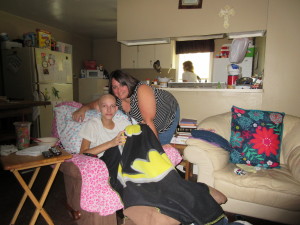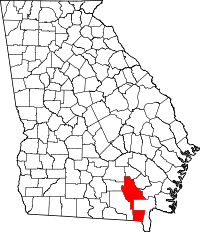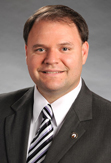A federal agency that investigates hazardous substances has accepted a community petition to investigate possible environmental links to cancers in the Waycross area.
Much of the residents’ concern recently has centered on three childhood cases of rhabdomyosarcoma and one case of Ewing sarcoma in and near Ware County, in the southeast corner of Georgia.
The Agency for Toxic Substances and Disease Registry, in a Dec. 18 letter to a community member, said it would conduct an assessment of the CSX Rail Yard and a former Atlanta Gas Light factory site in Waycross. Community members had called for the agency to become involved even before the rare childhood cancers were diagnosed this summer within two months of one another.
Community member Joan Tibor said Monday that she was glad that ATSDR had decided to step in, and added that she hoped the agency would allow residents to participate in the process.
The childhood cancers have reignited fears in the community that there is a connection between the diseases and where the children live, and specifically have raised concerns about a link to the history of industrial contamination in the Waycross area.
There are only 350 new cases of rhabdomyosarcoma each year in the United States, according to the American Cancer Society. The annual incidence of Ewing sarcoma is one case per every 1 million Americans, though the figure is somewhat higher for children, according to the National Cancer Institute.
The Atlanta-based ATSDR, part of the U.S. Department of Health and Human Services, evaluates the potential for adverse human health effects of exposure to hazardous substances in the environment. It works closely with the CDC, which is also based in Atlanta.
Tibor also said she was “very disappointed’’ by a recent draft report on the Ware cancer situation by the Georgia Department of Public Health.
The state, in an October draft report, said the Georgia Comprehensive Cancer Registry data show that childhood cancer incidence has been below the expected rates for the health district over the past decade. The only elevated rate found in the registry data was for lymphomas in Ware County, it said, but those cases were not clustered geographically or in time, and thus did not meet the definition of a cancer cluster.
The draft also said there has been a recent increase in the number of childhood cancer cases in neighboring Pierce County, but most of these cases are of various types and are not clustered geographically.
Complex criteria
State Rep. Jason Spencer (R-Woodbine), who has helped raise the profile of the cancer situation, said Monday that he is pleased that the federal agency has joined the investigation.
But Spencer, whose district includes Ware County, also said he is concerned that Public Health may lack the expertise to identify the pathway of exposure that may be causing the cancers.
“They’ve been conscientious about it so far,’’ said Spencer, who is a physician assistant as well as a legislator. He added that state officials have said there is a high level of birth defects in the Ware County area.
“Those things have to be looked at,’’ he said.
ATSDR said in its Dec. 18 letter to Tibor that it would not be investigating a third industrial site in Waycross. The agency said it was satisfied that the state investigation of the former Seven Out waste facility was thorough, and that potential health effects from that site were highly unlikely.
Cancer clusters are very difficult to prove. One problem with establishing direct causation in particular cases is the huge overall incidence of cancer. As the CDC points out, it is the second-leading cause of death in the United States. Nationwide, one out of four deaths are due to some type of cancer.
And Dr. Sharon Savage, chief of the Clinical Genetics Branch of the Division of Cancer Epidemiology and Genetics at the NCI, told Georgia Health News recently that “there are no established environmental risk factors for either rhabdomyosarcoma or Ewing’s sarcoma. It is difficult to identify the specific causes of most cancers, but particularly challenging for rare malignancies.”
A suspected cancer cluster, the state report said, is more likely to be a true cluster if it involves one or more of these factors:
Bullet: A large number of cases of one type of cancer, rather than several different types
Bullet: A rare type of cancer, rather than common types
Bullet: An increased number of cases of a certain type of cancer in an age group that is not usually affected by that type of cancer




